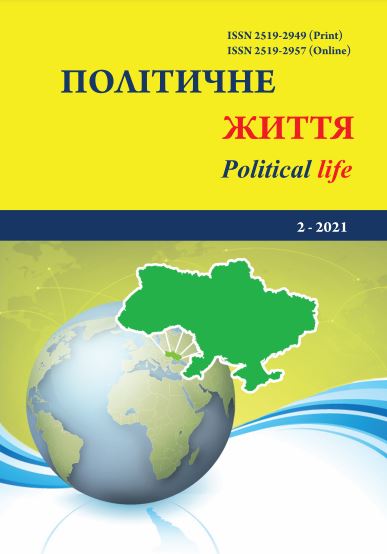Діяльність польських громадських організацій після набуття Польщею повноправного членства у ЄС
DOI:
https://doi.org/10.31558/2519-2949.2021.2.4Ключові слова:
Європейська інтеграція; громадські організації; фонди; фінансування; процеси; стратегіяАнотація
У статті узагальнено періоди формування громадських організацій включаючи сучасний період. Проаналізовано діяльність організацій в період повноправного членства Польщі у Європейському Союзі на підставі співпраці з урядом та на основі показників кількості організацій, сфер їх діяльності. Визначено основні типи класифікацій, актуалізовано типологію за сферами їх діяльності з урахуванням євроінтеграційного вектору Польщі. Акцентовано увагу на територіальній та кількісній складові функціонування громадських організацій..
Визначено основні проєвропейські організації, які діяли у контексті євроінтеграції Польщі та сприяли формуванню громадянського суспільства у Польщі і популяризації європейських ідей через залучення міжнародного фінансування..
З’ясовано особливості діяльності громадських організацій під час євроінтеграційного періоду, що була представлена співпрацею організацій з урядовою сферою та сферою бізнесу, що було відображено у розробці програм інформування, створенні стратегії і програми реалізації політики, спрямованої на розвиток громадянського суспільства.
З’ясовано, що зі вступом Польщі до Європейського Союзу у 2004 р. співпраця з Європейськими фондами тільки посилилась і була спрямована на реалізацію не лише європейських, а й соціальних проектів згідно з прийнятими програмами Європейського Союзу в періоди 2007-2013 рр.
та 2014-2020 рр.
Визначено, що під час повноправного членства Польщі у Європейському Союзі громадські організації продовжують розвиватися у межах європейського напрямку. На сучасному етапі розвитку громадських організацій Польщі, вони виконують роль не лише отримувача коштів від фондів ЄС, а й самі надають допомогу у питаннях європейської інтеграції.
Посилання
Kondycja sektora organizacji pozarządowych w Polsce 2015. Raport z badań. Stowarzyszenie Klon/Jawor. Warszawa, 2016. 176 s.
Najważniejsze pytania – podstawowe fakty. Polski sektor pozarządowy 2008. Stowarzyszenie KLON/JAWOR, Warszawa, 2008. 138 s. URL: http://www.ngo.pl/files/civicpedia.pl/public/badania2008.indd.pdf (дата звернення 10.04.2021).
Najważniejsze pytania – podstawowe fakty. Polski sektor pozarządowy 2010., Stowarzyszenie KLON/JAWOR, Warszawa, 2011. 85 s. URL: http://fakty.ngo.pl/files/civicpedia.pl/public/raporty/podstawowefakty_2010.pdf (дата звернення 10.04.2021).
Najważniejsze pytania – podstawowe fakty. Polski sektor pozarządowy 2012. Stowarzyszenie KLON/JAWOR. Warszawa,2013. 231 s. URL: http://www.ngo.pl/PodstawoweFakty_2012_raport/ebook/content/PodstawoweFaktyNGO_2012_KlonJawor_raport.pdf (дата звернення 10.04.2021).
Narodowа Programа Wspierania Rozwoju Społeczeństwa Obywatelskiego (NPWRSO). URL: https://www.spoleczenstwoobywatelskie.gov (дата звернення 5.04.2021).
Odpowiedzialne Państwo Fundacja Batorego. URL: http://www.batory.org.pl/programy_operacyjne/przeciw_korupcji (дата звернення 17.04.2021).
Okuniovska Y. The “third” sector of Рoland: key principles of functioning//Evropský politicky a pravni diskurz.Svazek 4.3.vydani. 2017. S.137-142.
Rozporządzenie Rady Ministrów z dnia 11 marca 2008 r. w sprawie dokonywania wydatków budżetu państwa w 2008 r. pochodzących ze środków z rezerwy celowej. Fundusz Inicjatyw Obywatelskich. URL: http://dziennikustaw.gov.pl/du/2008/s/49 (дата звернення 23.05.2021).
Strategia wspierania rozwoju społeczeństwa obywatelskiego na lata 2009 2015. URL: https://www.mpips.gov.pl/userfiles/File/ozytek/SWRSO%202009-2015.pdf
(дата звернення 13. 06.2021).
Strategii Wspierania Rozwoju Społeczeństwa Obywatelskiego . Rząd przyjmuje ważne uchwały. URL: http://www.ekonomiaspoleczna.pl/x/414040 (дата звернення 13. 05.2021).
Uchwały nr 240/2008 Rady Ministrów z dnia 4 listopada 2008 r. URL: https://www.mpips.gov.pl/gfx/mpips/userfiles/File/pozytek/Uchwala%20SWRSO%202009-2015.pdf (дата звернення 27. 05.2021).

